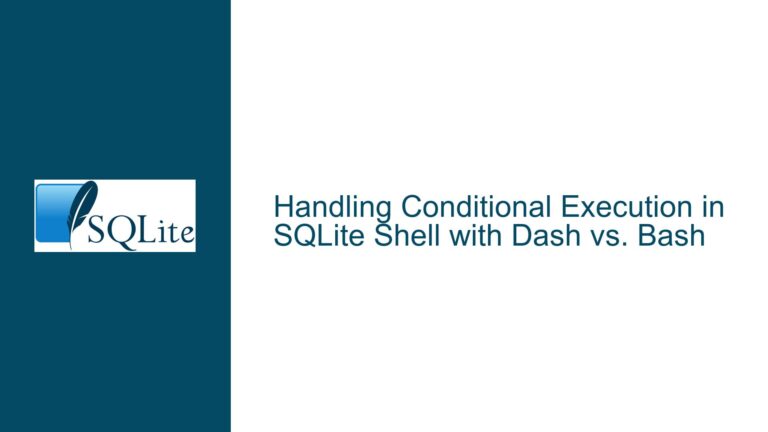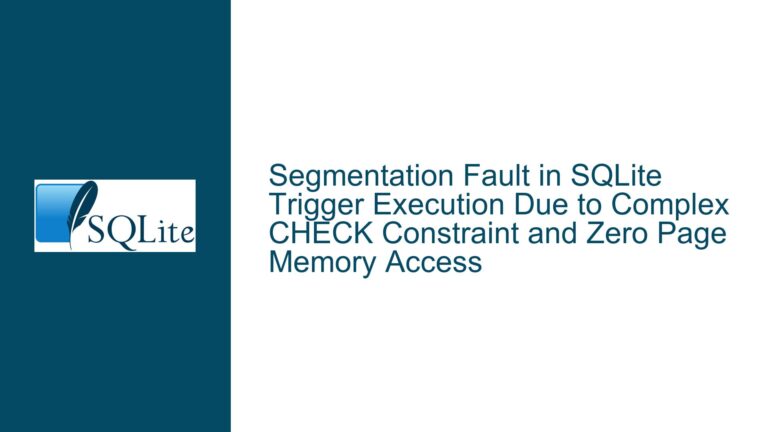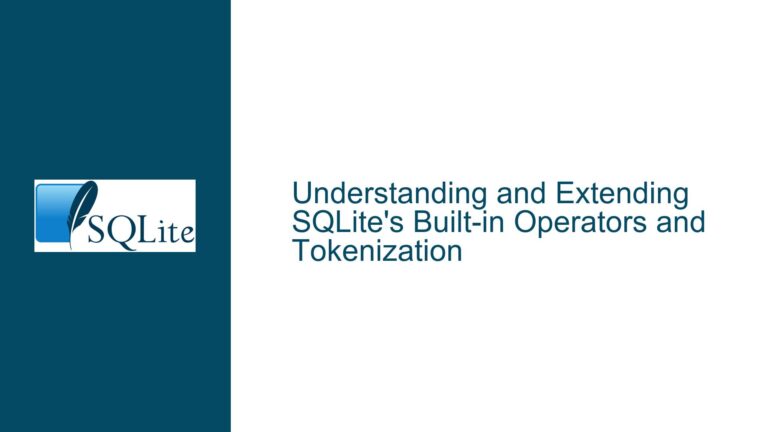Inconsistent Handling of Empty CSV Fields in SQLite
Issue Overview: Inconsistent Treatment of Empty Fields in CSV Import
The core issue revolves around how SQLite handles empty fields in CSV files, particularly when the file does not end with a newline character. Specifically, when the last field of the last record in a CSV file is empty and the file lacks a trailing newline, SQLite interprets this empty field as NULL instead of an empty string. This behavior is inconsistent with the treatment of empty fields in other records within the same file, where empty fields are correctly interpreted as empty strings.
Consider the following CSV file, tt.csv:
x,y
a,
b,
Here, the last character of the file is a comma, indicating that the second field of the second record is empty. When this file is imported into SQLite using the .import command, the result is:
a|
b|NULL
The first record correctly interprets the empty field as an empty string, but the second record interprets it as NULL. This inconsistency is problematic, especially when dealing with CSV files that conform to RFC 4180, which explicitly allows the last record in a file to be terminated by either a newline or the end-of-file (EOF). According to the standard, the presence or absence of a trailing newline should not affect the interpretation of the data.
The issue is further complicated by the fact that SQLite’s behavior diverges from the CSV standard, which treats empty fields as empty strings rather than NULL. This discrepancy can lead to unexpected results in data processing pipelines, particularly when the data is expected to conform to the CSV specification.
Possible Causes: Misinterpretation of EOF and Default Column Values
The root cause of this issue lies in how SQLite’s CSV import mechanism handles the end-of-file (EOF) condition and default column values. When a CSV file does not end with a newline, the import process may misinterpret the EOF as an indication that the final field is missing rather than empty. This misinterpretation leads to the field being assigned a NULL value, which is the default for missing data in SQLite.
Another contributing factor is the way SQLite handles default column values. By default, if a value is not explicitly provided for a column, SQLite assigns it a NULL value. In the context of CSV import, this default behavior can lead to inconsistencies when the import process incorrectly interprets an empty field as a missing value rather than an empty string.
The issue is further exacerbated by the fact that SQLite’s CSV import mechanism does not strictly adhere to the CSV standard (RFC 4180). According to the standard, an empty field should be treated as an empty string, regardless of whether it is followed by a newline or EOF. However, SQLite’s current implementation does not consistently apply this rule, leading to the observed inconsistency.
Troubleshooting Steps, Solutions & Fixes: Ensuring Consistent CSV Import Behavior
To address this issue, several steps can be taken to ensure consistent behavior when importing CSV files into SQLite. These steps include modifying the CSV import process, adjusting the handling of EOF conditions, and implementing workarounds for existing data.
1. Modify the CSV Import Process to Adhere to RFC 4180:
The most straightforward solution is to modify SQLite’s CSV import mechanism to strictly adhere to the CSV standard (RFC 4180). This would involve ensuring that empty fields are always treated as empty strings, regardless of whether they are followed by a newline or EOF. This change would eliminate the inconsistency observed in the current implementation.
2. Adjust the Handling of EOF Conditions:
Another approach is to adjust how SQLite handles EOF conditions during CSV import. Specifically, the import process should be modified to recognize that an empty field at the end of a file (without a trailing newline) should be treated as an empty string rather than a NULL value. This adjustment would align SQLite’s behavior with the CSV standard and eliminate the inconsistency.
3. Implement Workarounds for Existing Data:
For users who are already dealing with data affected by this issue, several workarounds can be implemented. One approach is to preprocess CSV files to ensure they end with a newline character before importing them into SQLite. This can be done using a simple script or command-line tool. For example, the following command can be used to append a newline to a CSV file if it does not already end with one:
sed -i -e '$a\' tt.csv
This command ensures that the file ends with a newline, which should prevent SQLite from misinterpreting the final empty field as NULL.
Another workaround is to use SQLite’s .import command with a custom null value indicator. By setting the .nullvalue to an empty string, users can ensure that empty fields are treated consistently:
.nullvalue ""
.import -csv tt.csv tt
This approach ensures that all empty fields, including those at the end of the file, are treated as empty strings rather than NULL.
4. Use the CSV Virtual Table Extension:
For more advanced use cases, users can leverage SQLite’s CSV virtual table extension to import CSV files. This extension provides more control over the import process and allows users to specify how empty fields should be handled. For example, the following command creates a virtual table from a CSV file and ensures that empty fields are treated as empty strings:
.load ./csv
CREATE VIRTUAL TABLE temp.t1 USING csv(filename='tt.csv', header=1);
SELECT * FROM t1;
This approach provides greater flexibility and ensures consistent behavior when importing CSV files.
5. Update to the Latest Version of SQLite:
Finally, users should ensure they are using the latest version of SQLite, as the issue has been addressed in recent updates. The fix ensures that empty fields at the end of a CSV file (without a trailing newline) are treated as empty strings rather than NULL. Updating to the latest version of SQLite will resolve the issue and ensure consistent behavior when importing CSV files.
In conclusion, the inconsistent handling of empty fields in CSV import is a known issue in SQLite that can lead to unexpected results. By understanding the root causes and implementing the appropriate solutions, users can ensure consistent behavior and avoid potential pitfalls in their data processing pipelines. Whether through modifying the import process, adjusting the handling of EOF conditions, or using workarounds for existing data, there are several approaches to addressing this issue and ensuring that CSV files are imported correctly into SQLite.






